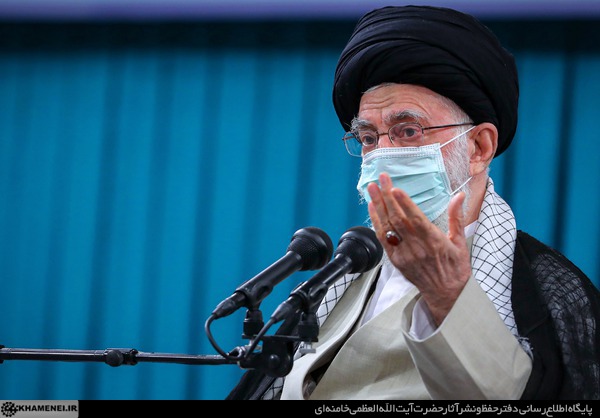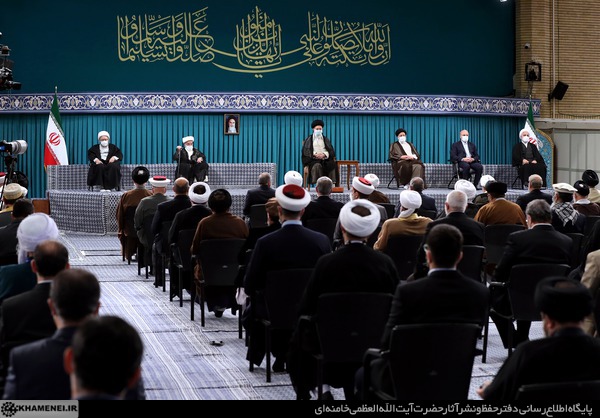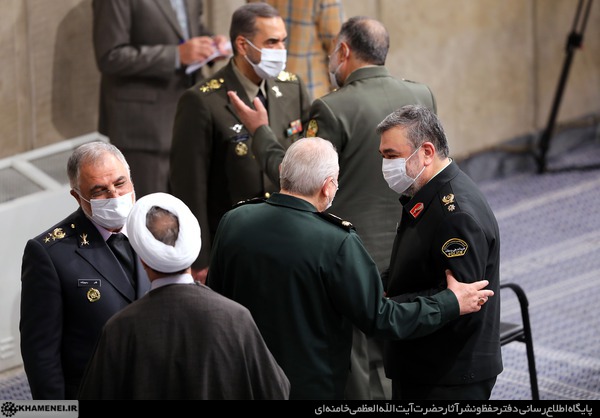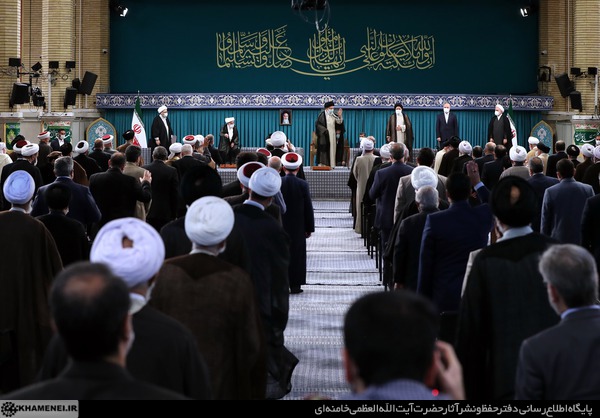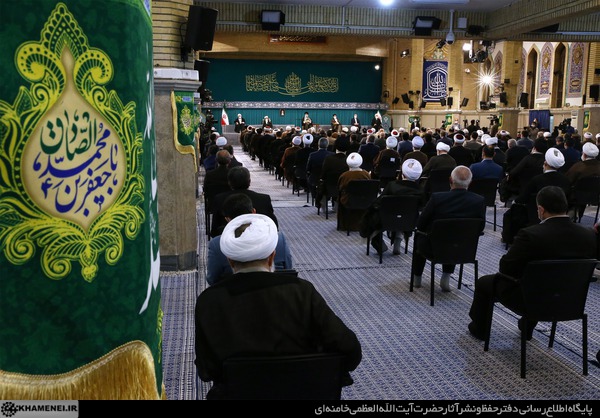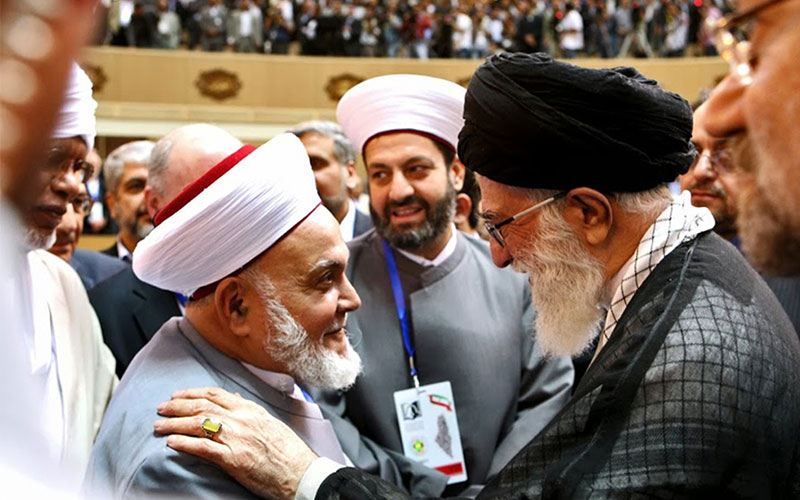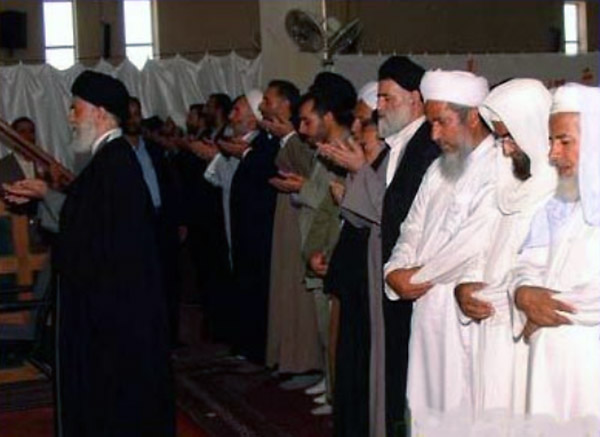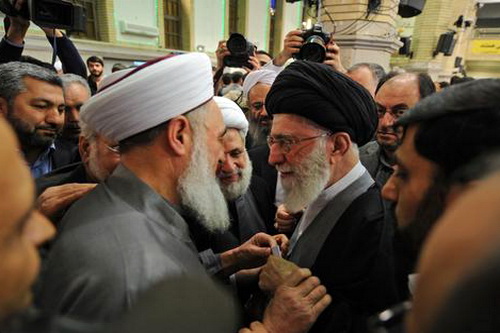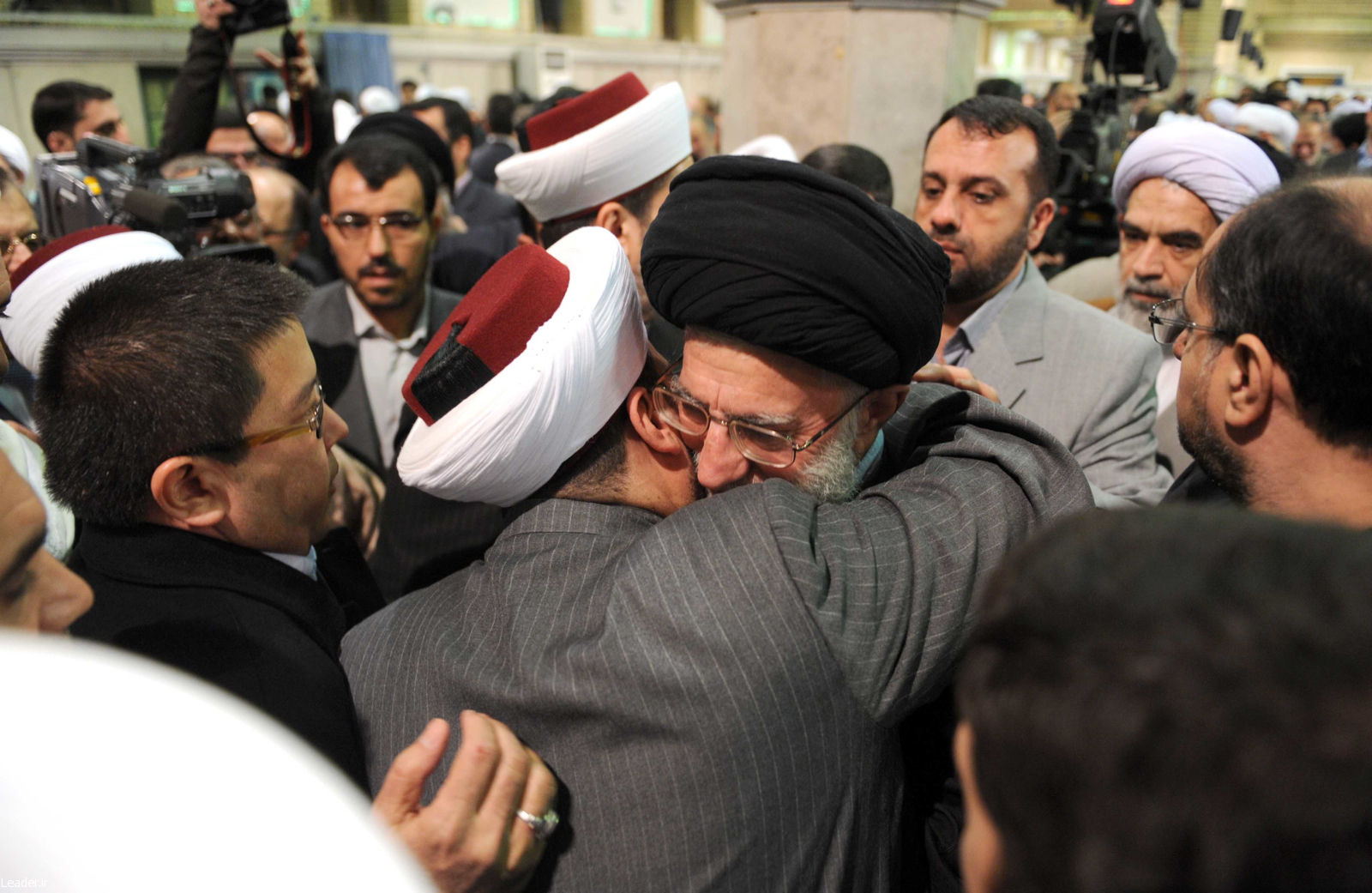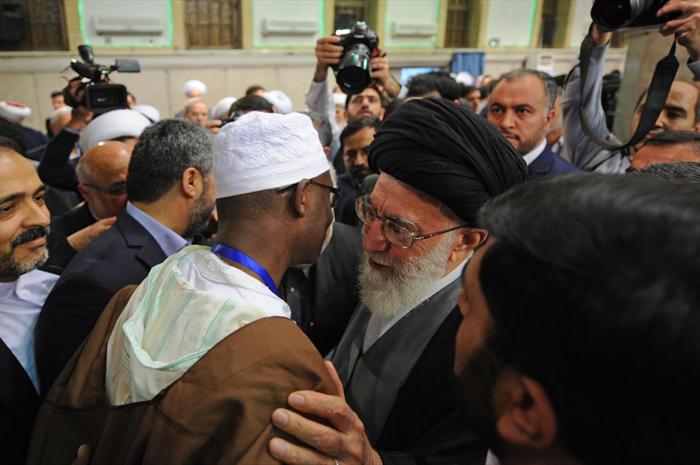The following is the full text of the speech delivered on October 24, 2021 by Imam Khamenei, the Leader of the Islamic Revolution, in a meeting with the government officials of the Islamic Republic and foreign participants in the 35th International Islamic Unity Conference. The meeting was held on the anniversary of the births of the Holy Prophet and Imam Sadiq (peace be upon them).

In the Name of God, the Beneficent, the Merciful
All praise is due to God, the Lord of the Worlds, and peace and greetings upon our Master Muhammad, upon his pure, immaculate Household, upon his chosen companions and upon his followers until the Day of Judgment.
I welcome all of you dear participants, particularly the honorable guests who have come for the Islamic Unity Conference and the brothers who have come to this meeting from other countries.
I would like to congratulate you on the auspicious anniversary of the birth of the esteemed Holy Prophet (may God’s peace and blessings be upon him and his Household) and also the blessed anniversary of the birth of Imam Sadiq (peace and greetings be upon him), which took place in the year 83 of the Hijri calendar on the same day that the Holy Prophet was born.
The birth of the Holy Prophet: The beginning of a new era in human life
The birth of the Holy Prophet was in fact the beginning of a new era in human life. It was a sign of the beginning of a new era of divine will and divine favors for humanity. Therefore, this birth is a very great event. The greatness of the birth of the Holy Prophet truly cannot be described in ordinary words. This is a very big incident. Some people have described it in the language of art and poetry, which is one way of portraying this event. One example of such poetry is the following.
Guidance was born, so the world was lit up
And smiles and admiration settled upon the lips of time
[From a poem by the Egyptian poet, Ahmad Showqi].
The language of art speaks in this way, “Guidance was born; light rained upon the universe. The lips of time opened with a smile and praise.” The greatness of this incident can be understood to a certain extent with such descriptions. This is an important event.
The great status of the Holy Prophet
The greatness of the event of the birth of the Holy Prophet equals the greatness of his status. His great status in creation is such that from the beginning to the end of creation, the Exalted God has not created another being as great as the Holy Prophet. The responsibility that God placed on his shoulders is just as great.
Because of this great responsibility, God says, “Allah did confer a great favor on the believers when He sent among them an apostle from among themselves.” [Qur’an, 3:164] God conferred a favor on humanity. Such is the greatness of the Holy Prophet. God, the Exalted, revealed the hidden book to the holy heart of the Prophet, uttered it through his pure tongue, entrusted him with the plan for humanity’s felicity in its entirety, and commissioned him to carry out this plan and to demand that his followers carry it out as well.
The duty of the believers toward the Holy Prophet in every era
Well, we are the followers of the Holy Prophet. We associate ourselves with the Holy Prophet. What is our duty? In every era, the duty of the believers is to see what position they are in, what religion asks of them, what duty has been entrusted to them, what things they should think about, and what they should do. They should understand these in every era. Well, religious scholars and intellectuals have discussed these issues at great length. I will discuss a few points in this regard. One point is about the Islamic nation and another is about Iran and the Islamic Republic of Iran.
The first duty of the Islamic nation at the current time: Acting in accordance with Islam’s all-inclusiveness
Regarding the issues related to the Islamic nation and the Muslims in general, two points should receive our attention, and I will discuss these briefly. One is the issue of acting in accordance with the all-inclusiveness of Islam. Islam is an all-inclusive religion and we should act in accordance with this all-inclusiveness. This is one issue. Another issue is the issue of the Muslims’ unity. These two issues are among the most important issues of our day. Of course, there are numerous important issues at the present time and these two issues are among the most important ones.
The enemies’ efforts to promote the idea that Islam should not interfere in matters related to anything besides the individual
Regarding the issue of acting in accordance with the all-inclusiveness of Islam, there has been an insistent effort, mainly on the part of political and materialistic powers, to reduce Islam to matters related to the individual and belief only. This effort has existed for a long time. I cannot specify a certain date and say that such efforts started from that date. But from about a hundred or a hundred-plus years ago, this effort has been pronounced in the Islamic world.
This effort has doubled after the formation of the Islamic Republic. They also try to make it look like it is not a political effort and make it look like an intellectual effort. As the westerners say, they have tried to “theorize” it. Thinkers, writers, activists and the like are commissioned to write about this and prove that Islam has nothing to do with social issues, matters concerning life and fundamental issues regarding humanity, that Islam is a belief of the heart, and that it is a personal relationship with God and a series of individual actions based on this relationship. They introduce this as Islam. They insist on proving this in the minds of their audience.
They want this inwardly political and ostensibly intellectual tendency, important areas of life and social relations to be liberated from Islamic interference. In managing society and building civilization, they say Islam has no role in building human civilization, it has no duty and there is no place for it. Islam has no role in the management of society. It has no role in the distribution of power and wealth in society. The society’s economy and various other social issues have nothing to do with Islam.
The same is true of war and peace, domestic and foreign policy and international issues. They sometimes say, “Do not turn diplomacy into ideology. Do not connect it to ideology.” They mean that Islam should not comment on foreign policy and international issues. In matters of spreading goodness, establishing justice, confronting evil and oppression and combating villainous forces in the world, Islam isn’t effective. In these important areas of human life, Islam is neither an intellectual reference point nor a practical guide. This is what they insist on.
Now, the reason for this insistence and its starting point are issues that are not related to my speech today. What I want to say is that, first of all, this truly anti-Islamic movement is mainly launched by the great political powers of the world. They are the ones who are active and working in this field. And they try to promote this using their intellectuals.
Muslims’ duty toward the all-inclusiveness of Islam: Promoting Islam’s viewpoint
Well, Islamic texts explicitly reject this, and we Muslims should pay attention to this matter. When I say that we should do our duty, I primarily mean that we should promote and express the view of Islam about itself and about the areas of human life it cares about, it gives an opinion about, it works on, it explains, it promotes, and it expresses. This is the first step. Then, we should try to put these into practice.
Religion encompasses all aspects of human life
What Islam states is that the field of activity of this religion is the entire scope of human life ranging from human emotions to social, political and international issues and including issues related to all of humanity. This has been clearly explained in the Holy Qur’an. If someone denies this, they have not paid attention to the words of the Qur’an.
There is a verse in the Qur’an that says, “Oh you who believe, celebrate the praises of Allah, and do this often and glorify Him morning and evening.” [Qur’an, 33:41-42] This is an issue related to one’s beliefs and emotions. But there is another verse that states, “Those who believe fight in the cause of Allah, and those who reject faith fight in the cause of evil: so fight against the friends of Satan.” [Qur’an, 3:76] This is another verse. So, “Celebrate the praises of Allah” and “Fight against the friends of Satan” mean that this entire vast scope is covered by religion.
One verse addresses the Holy Prophet saying, “Stand to prayer by night, but not all night, half of it or a little less or a little more and recite the Quran in slow, measured rhythmic tones.” [Qur’an, 73:2-4] In another verse, God tells the Holy Prophet, “Then fight in Allah’s cause, you are held responsible only for yourself, and rouse the believers.” [Qur’an, 4:84] This means that all these areas of life ranging from standing to prayer by night, supplicating and shedding tears, to fighting and showing one’s presence in the battlefield are areas where religion is active, and the Holy Prophet’s life confirms this.
Regarding financial rules, the Qur’an says, “But give them preference over themselves, even though poverty was their own lot.” [Qur’an, 59:9] This is a personal matter. Elsewhere, it says, “In order that it may not merely circulate between the wealthy among you.” [Qur’an, 59:7] This is about the correct distribution of wealth, which is a matter totally related to society. Elsewhere, it says, “That men may stand forth in justice.” [Qur’an, 57:25]
The Prophets and the Favorites of God have come to establish justice. One verse says, “To those weak of understanding make not over your property, which Allah has made a means of support for you.” [Qur’an, 4:5] In another verse, God says, “Of their goods, take alms, so that you might purify and sanctify them.” [Qur’an, 9:103] All aspects of financial matters are mentioned in the form of general rules and general guidelines. Of course, there should be plans for implementing these rules, but these are the general rules and guidelines that are mentioned. In other words, Islam has spoken about all these matters.
The Quran also has verses about security and the safety of people in society, “Truly, if the hypocrites, and those in whose hearts is a disease, and those who stir up sedition in the city, desist not, We shall certainly stir you up against them.” [Qur’an, 33:60] Another verse says, “When there comes to them some matter touching public safety or fear, they divulge it. If they had only referred it to the Messenger…” [Qur’an, 4:83] These verses mean that Islam has an opinion in all important aspects of social life. The verses I have mentioned are a small part of those that exist in the Holy Qur’an. Hundreds of such examples can be seen in the Qur’an.
A person who is interested in and is familiar with the Qur’an and its rules understands that this is the Islam that the Qur’an introduces. The kind of Islam that the Qur’an defines and introduces is an Islam that is involved in all aspects of life and that has opinions, viewpoints and demands. Well, we should know this, and we should answer those who try to deny this clear truth.
The appointment of an Imam and Leader
On the other hand, because there are social issues and important tasks that need to be done such as building a society and civilization in Islam, Islam attends to the issue of governance as well. It is not the case that Islam would demand social order, but not clarify the issue of leadership for religious and worldly affairs. When religion becomes a system, a system related to the individual and society, and becomes a system that has opinions and demands on all individual and social issues, then it is necessary to determine who is at the head of this society and what characteristics this head should have. Thus, religion must appoint an Imam.
If you look at the Qur’an, there are at least two verses in which prophets are described as Imams. One of them is, “And We made them Imams, guiding men by Our command, and We sent them inspiration to do good deeds, to establish regular prayers.” [Qur’an, 21:73] Another verse that mentions God appointing Imams is, “And We appointed, from among them Imams, giving guidance under Our command.” [Qur’an, 32:24] This means that a prophet is an Imam, leader and commander in society.
That is why Imam Sadiq (peace and greetings be upon him) stood up among the crowd gathered in Mina and shouted, “Oh people, the Messenger of God was indeed an Imam.” In order for people to understand what the correct religious status of the Holy Prophet was, he stood up among the crowd and shouted, “Oh people, the Messenger of God was indeed an Imam.” Well, this is one issue. Throughout the world of Islam, religious intellectuals, religious scholars, writers, researchers and university professors have the duty to explain this, because the enemy heavily invests in promoting the opposite viewpoint.
The heavy responsibility of intellectuals and scholars for explaining the scope of religion’s activity
Of course, our task in Iran is even heavier in this regard. The reason for this is that there are more possibilities here for us to work on this. The country's officials, especially officials in cultural fields and people who have important podiums available to them in some areas of society, should explain this. Inside the country, it is not the case that now that an Islamic system has been established in the Islamic Republic, we do not need to explain this issue. No, right now in our country some falsehoods are being promoted in this regard and certain things are being said, but we are active in this field. Well, this is a topic that is related to the world of Islam.
The second current duty of the Islamic world: Unity and solidarity
Another topic that is also related to the world of Islam is the issue of unity, the issue of the solidarity of Muslims. This is a very important issue. Of course, I have spoken about unity very much. May God bestow mercy on our magnanimous Imam who established Unity Week, and who constantly spoke about and highlighted the unity of Muslims. I too have spoken at length on this issue, but we must speak more about it.
A word of thanks to influential scholars in the area of Muslims’ unity
Before I say a few words about the unity of Muslims, I need to mention some prominent, hard-working personages who were working actively on the issue of Islamic unity including the late Mr. Taskhiri (may God be pleased with him). He was one of our most diligent people working in this field. He worked hard for many years, even when he was ill. Before him was the late Sheikh Muhammad Vaezzadeh (may God be pleased with him) who was a great scholar, learned man and master of the Islamic sciences. He too worked in this field for several years. These are people who were from Iran.
From Syria there was the great martyr Sheikh Mohammad Ramadan al-Bouti. He was a distinguished martyr who truly worked hard. One of these great scholars in the Islamic world who worked in the area of bringing unity was the late Sheikh Muhammad Ramadan al-Bouti (may God be satisfied with him). Martyr Sayyid Muhammad Baqir al-Hakim was also one of the important people who worked in the area of the Muslim’s unity. One of the people who encouraged me to establish a Conference on Islamic Unity was Martyr Sayyid Muhammad Baqir al-Hakim.
In Lebanon too, the late Sheikh Ahmad al-Zain who recently passed away was one of the scholars working in the field of bringing unity. He was close to us and one of our friends. Before him was the late Sheikh Sa’id Shaban from Lebanon who was also one of our good friends.
May God have mercy on those who were among the people who truly believed in the unity of Muslims and believed in the unification of Muslims. I hope that God, the Exalted, will shower His mercy and blessings on the pure souls of all those whom we have named and those whom we have not named. There were many such people before them as well, people from Iraq, Iran, Egypt and elsewhere. There are many people who have struggled in this field, but I cannot mention the names of all of them.
Important points and needs deserving attention regarding unity:
- Muslims’ unity is a definite obligation, not merely an ethical matter
I would like to raise a few points about the unity of Muslims. One point is that the unity of Muslims is a definite duty mentioned in the Qur’an and not something voluntary. We must look at it as a responsibility. This is the command of the Holy Qur’an, “Hold fast, altogether, by the rope which Allah stretches for you and be not divided among yourselves.” [Qur’an, 3:103] This means that even in holding onto the rope of God and obeying Him, we should do this all together. “Hold fast, altogether, by the rope which Allah stretches for you and be not divided among yourselves” is a command. Why do we try to turn this command into a moral belief? This is a command and a decree that should be acted upon. There are also many other verse in the Qur’an in this regard, such as, “And fall not into disputes, lest you lose heart and your power departs.” [Qur’an, 8:46] Thus, one point is that this is an obligation.
- Muslims’ unity is a fundamental matter, not a tactical one
The second point is that the unity and solidarity of Muslims is not a tactic in the way as some people now think that we should be united because of certain circumstances. No, it is a matter of principle. The cooperation of Muslims is necessary. If Muslims are united, they will help each other and all will become strong. When this cooperation exists, even those who want to interact with non-Muslims, which is alright, will enter into this interaction with full hands. So, the next point is that this is a fundamental matter, not a tactical one.
- The great distance between Muslims is the reason for the emphasis on unity
The third point is that the reason we in the Islamic Republic greatly emphasize the unity of Muslims is that there is a wide gap. Today, there is a constant, serious, premeditated effort to create differences between Muslim denominations and between Shi’a and Sunni. Today, the words "Shi’a" and "Sunni" have entered the American political discourse! What do Americans have to do with Shi’a and Sunni? For several years now in American political discourse, the issue of being a Sunni or a Shi’a has been introduced.
They identify some countries as Shi’a countries and some as Sunni countries. Despite the fact that they are against the essence of Islam and are hostile toward it, they do not abandon the issue of Shi’a and Sunni. So, such issues exist. They are aggravating the discord on a daily basis and increasing the misunderstandings. Therefore, we emphasize unity and this is the reason.
As you can see, the puppets installed by the US create discord in the world of Islam wherever they can. The closest example is the tragic, upsetting events in Afghanistan these last two Fridays where they blew up a Muslim mosque while the people were praying. Who blew it up? DAESH. Who are the DAESH? DAESH is the same group about whom the Americans – the Democrats in the United States – clearly stated, “We created this.” Of course, they don’t say this now. They deny it. But they have done this and they have explicitly acknowledged it. Therefore, it is necessary for us to pursue this matter.
- Discussions and conferences are only the beginning of our work, not the end
The fourth point is that we should not think that when we gather, hold discussions and talk during Unity Week every year – be that one or two meetings in different parts of the world – we shouldn’t think when we sit together and talk that we have done our duty. No, our duty is not finished by just doing these things. It is necessary for everyone, in any place and wherever they are, to act as an axis for the important discussion of unity. We must discuss, explain, motivate, plan and divide the work in these areas. This is a task that is obligatory and necessary, and it must be done.
For example, in the case of Afghanistan when I say that we need to formulate plans one way to prevent these incidents is for the current, honorable Afghan officials to go to the mosques themselves and to say their prayers there or to encourage the Sunni brothers to go to these centers. When we say that we should plan, these are things that can be done in the world of Islam.
- The creation of a new Islamic civilization depends on the cooperation of all Muslims
The next point is that one of the goals of the Islamic Republic that we have defined is to create a new Islamic civilization. That is, one of the goals of the Islamic Republic and the Islamic Revolution is to create a new Islamic civilization by taking into consideration today's capacities and today's facts and realities. This is only possible with the unity of the Shi’a and Sunnis. This cannot be done by just one country or one sect. To do this, everyone must work together. This is the next point. So, this is another necessary matter.
- Palestine is the main indicator to show the unity of Muslims
Another point - the sixth point – is that the main indicator to show the unity of Muslims is the issue of Palestine. The issue of Palestine is an indicator. If Muslims’ unity is realized, the Palestinian issue will definitely be resolved in the best possible way. The more serious we are on the Palestinian issue and work to regain the rights of the Palestinian people, the closer we come to the unity of Muslims. In this recent issue of normalizing relations – where unfortunately some governments made a mistake – they made a big mistake. They sinned by normalizing relations with the usurping, despotic Zionist regime. This move is against Islamic unity and solidarity. They should return from this path and compensate for this grave mistake. Well, these points were about Islamic unity. These were the two points that I wanted to discuss regarding various aspects of the international Islamic community.
- The Iranian people follow the lead of the Holy Prophet
As for issues related to our own country, although our opponents, the enemies of religion, and those who followed the US ruled over our country for years, the people have always been believers. Praise God, the Iranian nation has been like this for a long time. Today more than ever, we consider ourselves to be the followers of the Prophet.
Well, what form does this following take? Please pay attention to the word “following.” It means following someone’s lead and moving after him. Well, how should we move? The Qur’an has specified this, “You have indeed in the Messenger of Allah a beautiful model of conduct for anyone whose hope is in Allah and the Final Day.” [Qur’an, 33:21] The word “uswah” in Arabic means a role model. Well, we should follow that role model and do as he did. We should follow his lead in morality and ethics. Of course, this is not an easy job considering the vast scope of his ethics. We are too small to want to achieve that same vast scope. Nevertheless, we should work hard in this regard.
Well, the Holy Prophet’s praiseworthy qualities are not confined to one or two. When the Holy Prophet’s honorable wife was asked about his behavior, she said, “He was the embodiment of the Qur’an.” The Holy Prophet was the embodiment of the Qur’an. Well, this requires a detailed discussion.
I have chosen three points about the Holy Prophet and his characteristics. This is like a person choosing three stars from this galaxy that is filled with light. We, the people of Iran, should highlight these three points in the Islamic Republic, care about them and act upon these. These three points are patience, justice and morality.
Following the Holy Prophet in patience and endurance in the face of hardships and difficulties
Patience is something prominent we can see in the life of the Prophet. Of course, there are tens of verses about patience. The concept of patience and a person’s duty to be patient may be seen in different parts of the Qur’an. But the patience that is characteristic of the Holy Prophet has also been highlighted. In more than ten cases - perhaps about twenty - the Prophet has been addressed about patience. It is important that from the beginning of revelation, God commanded the Prophet to be patient.
In Chapter Al-Muddathir, God says, “But, for your Lord's Cause, be patient and constant.” [Qur’an, 74:7] And in Chapter Al-Muzzamil it is written, “And have patience with what they say.” [Qur’an, 73:1] These two chapters are among the first chapters sent down on the Holy Prophet. From the first step, the Exalted God tells the Holy Prophet that he should have patience.
I have written in my notes that in twenty verses God has addressed the Holy Prophet saying that he should have patience. For example, God has said, “So wait with patience for the Command of your Lord.” [Qur’an, 68:48] There are also many other verses. What does patience mean? It means endurance. There are many narrations where patience has been described as being patient in not committing sins, being patient in obedience and being patient in the face of various events. Well, patience means endurance.
We should show endurance in the face of temptations to commit sins. We should also show endurance with regard to carrying out our duty and confront laziness and idleness . We should show endurance when facing the enemy. We should keep control of ourselves in the face of various calamities. We should control our will. This is what patience means. Patience means endurance. Today, we need patience more than ever.
You officials who are here and who hold various positions, what is most important for you is patience. You must persevere, resist, endure pressures, endure hardships, and move on. You should not stop. This requirement of having patience and perseverance is for us who are responsible in this country, and it means that we should not stop. Movement must not stop; it must continue. This is patience. “You have indeed in the Messenger of Allah a beautiful model of conduct.” This is how we can follow the Holy Prophet’s lead.
Following the Holy Prophet in justice
The second point is about justice and equity. One of the most important – perhaps the most important intermediate goals of sending prophets – was to administer justice, “We sent aforetime our apostles with clear signs and sent down with them the Book and the Balance of Right and Wrong, that men may stand forth in justice.” [Qur’an, 57:25] The purpose of sending prophets and divine books was to establish justice and encourage society to work for justice.
In the Qur’an, the Holy Prophet is quoted as saying, “And I am commanded to judge justly between you.” [Qur’an, 42:15] It is God’s command for us to establish justice. All wise people in the world accept this. Even the most oppressive, malicious people in the world cannot deny the necessity of having justice. Some even claim to be just with complete shamelessness despite the fact that they are oppressors. The Holy Qur’an mentions that justice should be administered even in the case of enemies. We should not be unjust with respect to a person who is our enemy, “And let not the hatred of others to you make you swerve to wrong and depart from justice. Be just: that is next to piety.” [Qur’an, 5:8]
Even an enemy should be treated fairly. So this is another task, and this is primarily our responsibility. Whatever decision you make and whatever regulation you make, whether in the Islamic Consultative Assembly where you pass laws, in the government, or in various other positions of management throughout the country, one of the most important things you take into account should be the issue of justice. You should think, “Is this in accordance with justice or not?” Sometimes, it is necessary to prepare an attachment describing justice for that regulation so that it becomes clear that this regulation and law is being implemented in accordance with justice.
This is the second point. However if we wish to observe justice, it should be noted that justice is not just about the distribution of property and wealth. Justice and fair treatment should be witnessed in everything. In the internet today, one sometimes witnesses injustices. They say untrue things, they slander, they lie, they promise without knowledge. These are acts of injustice and these things should not be done.
A person who works with the internet needs to watch over himself, and those who control the internet need to be even more vigilant to ensure that such things do not happen. We should learn and get used to treating people fairly. Even when you speak, if you are not on good terms with someone and you do not share their viewpoint, it is alright. It is your opinion. It may be the right opinion, but it should not be contaminated with slander, lies, insults and the like. It is very bad to contaminate one’s viewpoint with these things. These statements were about justice.
Following the Holy Prophet in Islamic morality
As for ethics and morality, we should follow the Holy Prophet’s example in ethics. God, the Exalted, said, “And you stand on an exalted standard of character.” [Qur’an, 68:4] Something that our Creator has said is “an exalted standard of character” is something extraordinary, “And you stand on an exalted standard of character.” Such morality should always receive our attention and be a guideline for us. We should behave in an Islamic way and be humble and forgiving. These are examples of Islamic ethics. We should be tolerant in personal matters. Of course, being tolerant is not permissible with regards to public matters and that which is related to the rights of the people. But in the case of personal matters, we can be tolerant. We should be kind toward others and avoid lying, insulting and having doubts about the believers. We should also forgive the believers. One of the supplications in Sahifah al-Sajjadiyyah says, “Oh God, I forgive everyone who has done an act of injustice toward me, who has said an untrue thing about me and whom I can bring to justice.” This is Imam Sajjad’s supplication in Sahifah al-Sajjadiyyah. These are examples of Islamic ethics. We should carry out our duties in this regard.
Dear brothers, dear sisters, we have to act and we have to take action. Issues do not end with claims. We claim to be Muslims. We claim to be the Islamic Republic. Therefore, we must be truly Islamic. We must follow the Holy Prophet. This great, blessed anniversary of his birth is an opportunity to think about and study this issue and to show our true determination on this path.
I congratulate all of you again. I congratulate the dear Iranian nation. I congratulate all the Muslims throughout the world and the Islamic nation. I congratulate all the liberated people in the world, and I send greetings to the pure souls who were martyred on the path of Islam and the path of the school of the prophet.
I send greetings to the pure soul of our magnanimous Imam who opened up this path to us and who guided us toward this great endeavor. I ask God, the Exalted, to bestow His paradise and His mercy on all of them. And I ask Him to bestow success on the people of Iran, in particular on you officials, on you dear guests and on us.
Greetings be upon you and God’s mercy and blessings.
Reference:
Official website leader khamenei.
